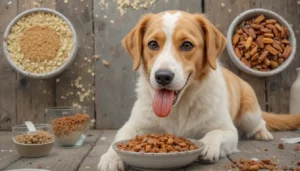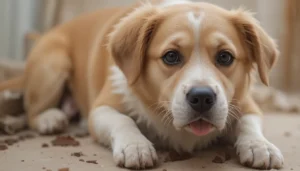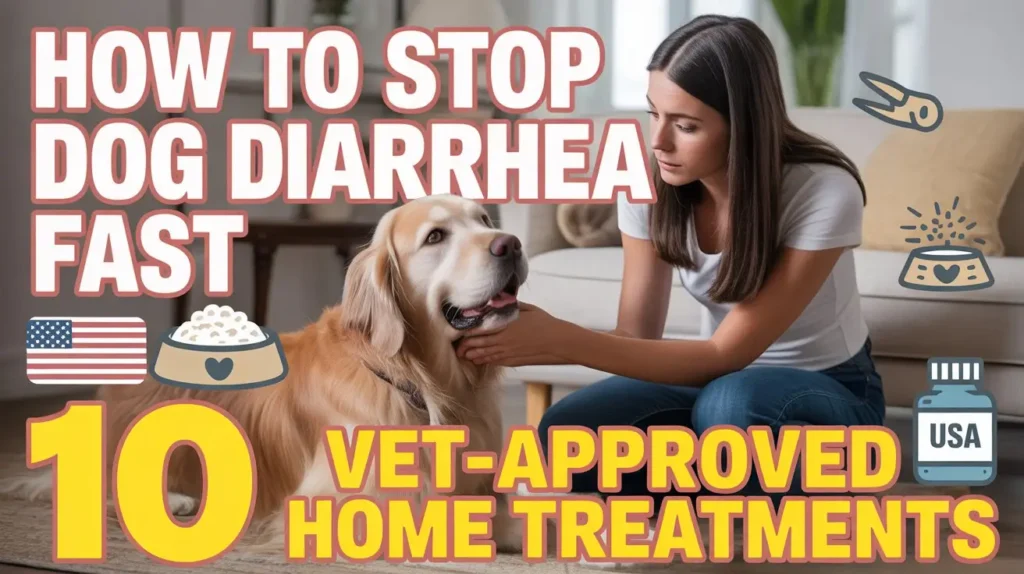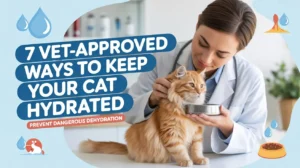Table of Contents
One of the most stressful but ordinary problems of dogs is dog diarrhea. When your dog has a diarrhea, then most likely you are concerned about what caused it and how to make it stop quickly. There is no need to panic: in the majority of cases, dog diarrhea can be treated in the hospital through proper treatment and care. This step-by-step, veteran-tested guide will direct you on 10 powerful steps to remedy dog diarrhea without drugs and to get your pup feeling better once again.
You may be looking to treat dog diarrhea, you may be wondering, what is best to feed a dog with diarrhea, or asking yourself, what can I give a dog diarrhea, or should I call the vet, this article is the answer to all the questions you have, and all the reasons and cures of dog diarrhea.
Understanding Dog Diarrhea

What Is Dog Diarrhea?
Dog diarrhea COULD be said to be loose, runny, or frequent. It is how the body will eliminate anything that is poisonous or bacteria or even something that cannot be digested in the digestive system of your dog. Although instances of diarrhea are normal, chronic diarrhea or sudden diarrhea may be indicative of underlying health problems.
Why You Shouldn’t Ignore It
Dehydration, the most significant threat in the case of a dog with diarrhea. Continuous loss of water and electrolytes may cause your dog to be weak and even cause a medical emergency. Home care early on coupled with remedies that are approved by a vet may help a lot.
Common Causes of Dog Diarrhea

The etiology of diarrhea in dogs is unlimited. This is by identifying the cause so that you are in a position to make the right decision on the type of dog diarrhea remedy to prevent the future attacks.
1. Dietary Indiscretion
Dogs are curious eaters. Trash, spoilt food or even fresh delicacies cause an upset to their stomachs. This is termed as garbage gut and is one of the greatest causes of dog diarrhea.
2. Sudden Diet Change
The abrupt shift in food can cause an appalling impact on digestive system of your dog. Do not change new food suddenly within less than 7 to 10 days.
3. Food Allergies/Intolerances.
Dogs can also react to some foods as chicken, beef or grains as human beings cause diarrhea to dogs.
4. Parasites
These worms are Giardia, hookworms, and roundworms which in most cases lead to chronic diarrhea in the dog, especially in puppies.
5. Infections
Bacterial or viral infections (including parvo) could cause severe diarrhea in dogs. These are supposed to be taken to the veterinary immediately.
6. Stress or Anxiety
Dog diarrhea stress can be through traveling, new environment or noise.
7. Antibiotics or Medications
The antibiotics also lead to some dogs developing dog diarrhea since the antibiotics destroy the bad and good gut bacteria. The way to get rid of this side effect is to always ask your vet about probiotics.
10 Step-by-Step Vet-Approved Tips to Stop Dog Diarrhea at Home

You have understood what causes the diarrhea in your dog, and now it is time to discuss 10 steps that you can implement to ensure treating your dog diarrhea at home without facing any danger.
Step 1: Withhold Food (for 12–24 Hours)
To have your dog take a food break will help ease the system and the bowels will rejuvenate. Ensure that your dog has unlimited supply of fresh water so that it does not get dehydrated.
Caution: Puppies, and small breeds are not supposed to compete in starving longer than 12 hours.
The specified step alone will enable your dog to start settling a diarrhea on its own.
Step 2: Keep Your Dog Hydrated
Dog diarrhea causes the loss of fluids that may easily result in dehydration. Provide clean, cool, water, or a salty solution like plain Pedialyte ( Consult with your vet on the level).
And another rehydration mix can be prepared at home:
- 1 liter of water
- 1 teaspoon of sugar
- 1/2 teaspoon of salt
Give in small sips quite often during the day.
Step 3: Introduce a Bland Diet
Take away the fast afterward and begin feeding on a boring, easily digested food to soothe the stomach of your dog. Home based therapy of the best dog diarrhea usually begins with food.
Vet-recommended bland diet:
- White rice cooked and chicken cooked (no seasoning).
- Boiled ground turky + plain pumpkin puree.
- Potatoes (boiled) and lean beef (fat taken away).
reward miscellaneously every 34 hours. The entire process should be repeated 2-3 days when we should resume normal food.
The fourth step is Pumpkin to Dog Diarrhea.
Pumpkin is one of the best natural treatments of dog diarrhea. It is high in fiber, and it aids in taking away excessive water within the intestines.
Plain canned pumpkin (not pie filling) should be used.
- Small dogs: 1 teaspoon
- Medium dogs: 1 tablespoon
- Large dogs: 2 tablespoons
It is best added to the boring food of the dog.
Step 5: Try Probiotics
Probiotics can restore the normal bacteria in the gut in the event your dog has diarrhea following the intake of antibiotics. Probiotics increase the digestion and decrease inflammation.
Available sources of probiotics where no adverse effects are observed after consumption include:
- Plain yogurt (unsweetened)
- Dog-operational probiotic capsules or chews.
- Kefir (in small amounts)
Probiotics form a major component of any treatment plan of dog diarrhea.
Step 6: Feeding on small, frequent meals
Rather than big meals it is better to have small meals many times a day. This assists the gut of your dog to digest slowly and it will also minimize irritation.
This is particularly noteworthy when it comes to making the choice of what to feed dogs with their diarrhea since the large meals may overload a system.
Step 7: Do Not Eat Fatty or Rich food.
During recovery, avoid:
- Dairy products
- High-fat meats
- Human snacks
- Raw foods
Keep to the mild foods till your dog is completely healed of the diarrhea.
Step 8: Slippery Elm or Psyllium Husk this ingredient is optional.
These natural fibers calm down the digestive tract and stiffen stool. Mix a small amount with food:
- Slippery Elm powder: 1/4 tsp of each 10 lb. body weight.
- Psyllium Husk: ½ tsp per 10 lbs
The supplements are not harmful to the diarrhea of dogs and are frequently suggested by holistic veterinarians.
Step 9: Pay Special attention to Stool Alterations.
- Monitor color, consistency and frequency.
In case you see in dogs bloody diarrhea, black tarry excrements, or vomiting, call a vet.
Stool tracking is a good way to know whether you can restore your health using home remedies or you need professional assistance.
Step 10: Warden Your Veterinarian, As long As It Yourself.
In case the diarrhea of the dog continues more than 48 hours, in case it appears to make your dog weak, in case you find blood or vomiting, then visit a vet immediately. The severe or chronic one might require laboratory examination to eliminate parasites, infections, food allergies.
Also keep in mind that attention to dietary change in addition to the medication is often combined to treat the dog diarrhea that is approved by vets.
What to Feed a Dog with Diarrhea.

It is important to know what to feed a dog once it has diarrhea in order to recover in a short period. The appropriate diet has the ability to calm the gut and replenish nutrients.
Supply of food to dogs with diarrhea is best accomplished through food supplements such as these:
- Boiled chicken and rice
- Scrambled eggs (plain)
- Pumpkin puree
- Low-fat cottage cheese (unless intolerated)
- Mashed sweet potatoes
- Plain oatmeal
The Resumption of Ordinary Food.
- After 2–3 days of improvement:
- Combine 3/4 bland food/1/4 regular food 2 days.
- Then 50/50 for 2 days
- Then 25% blank + 75% normal and switched completely.
- This slow shift eliminates the occurrence of dog diarrhea.
When to Worry: Signs of Serious Dog Diarrhea

Call your vet if you notice:
- More than 2 days of diarrhea.
- Blood in stool
- Vomiting and lethargy
- Loss of appetite
- Signs of pain or bloating
- No antibiotic-induced dog diarrhea had improved.
- Moderate or severe dehydration or fever can require treatment with IV fluids or medication.
Natural Treatment of Dog Diarrhea – pure Natural Remedies of Dog Diarrhea.
Should you lean to holistic curing after are the following gentle cures:
- Pumpkin puree: Equalizes the moisture of the stool.
- Rice water: Calms the stomach.
- Probiotics: Replace the intestinal flora.
- Slippery Elm: Protection of Intestines.
- Chamomile tea: Calms the gut (chilled, in little amounts)
These are home remedies that are natural and can be used alongside bland diets to cure digestive problems.
Preventing Dog Diarrhea
It is always better to prevent than cure!
To prevent the future diarrhea of dogs, there are some easy ways of preventing it, as follows:
- Introduce new foods slowly.
- Store rubbins off the pavements.
- Avoid giving table scraps.
- Stick to schedule diet and eating schedule.
- Deworm your dog regularly.
- Keep vaccinations up-to-date.
- Probiotics are to be consumed during or after antibiotics.
- They should have access to clean potable water on a daily basis.
Such measures will also contribute a long way as to avoiding a dog diarrhea reoccurrence.
It is understandable that when your dog is diarrheing you start worrying, but with a steady and patient treatment, the majority of dogs get better in a short period of time. The initial step should always be to be hydrated, fast, and on a bland diet. Mix treatments of natural dog diarrhea such as pumpkin and probiotics to heal faster.
Always keep in mind that prevention is possible with the help of proper nutrition, timely changes, and removal of stress. When the diarrhea of your dog does not stop and even gets worse, then make an individual approach to your vet.
Your pet is in your care, now do it as soon as possible, watch, and provide your dog with the comfort and care that it rightly deserves.
Frequently Asked Questions (FAQs)
1. What can I give a dog for diarrhea?
You can give boiled chicken and rice, pumpkin puree, and plain yogurt. For hydration, use water or vet-approved electrolyte solutions.
2. How long does dog diarrhea last?
Mild dog diarrhea usually resolves within 24–48 hours with home care. Persistent diarrhea needs a vet check.
3. Is it normal for dogs to have diarrhea after antibiotics?
Yes, dog diarrhea after antibiotics is common due to gut bacteria imbalance. Use probiotics to restore healthy flora.
4. Should I feed my dog when he has diarrhea?
Wait 12–24 hours, then introduce a bland diet like rice and chicken in small portions.
5. What should I feed dogs with diarrhea?
Plain boiled chicken, white rice, pumpkin, and oatmeal are safe and gentle on the stomach.
6. Can stress cause diarrhea in dogs?
Absolutely. Changes in environment, travel, or loud noises can trigger stress-induced diarrhea in dogs.
7. When should I take my dog to the vet?
If your dog’s diarrhea lasts more than two days, contains blood, or is accompanied by vomiting or lethargy, see a vet.
8. Are human anti-diarrheal medications safe for dogs?
No. Never give Imodium or Pepto-Bismol without veterinary approval—they can be toxic to dogs.
9. Can I prevent diarrhea in dogs naturally?
Yes—keep diet consistent, use probiotics, and avoid sudden food changes.
10. How can I treat my dog’s diarrhea at home fast?
Fast your dog for 12 hours, rehydrate, feed a bland diet, and use pumpkin or probiotics. These home treatments for dog diarrhea work effectively in most mild cases.







